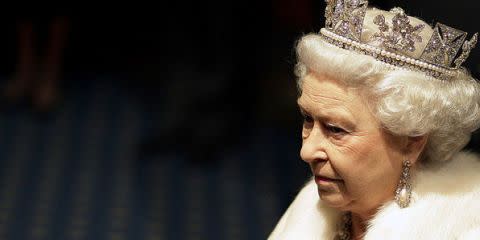What Will Happen When Queen Elizabeth II Dies?

Following the death of her father King George VI in February 1952, Princess Elizabeth became Queen at the age of 25. Now at 94, she has been on the throne for more than 65 years and is the world's longest-reigning living monarch.

For many, this incredible achievement means they have never known life without Queen Elizabeth, but she can't go on forever. When the time comes, the passing of the Queen is sure to trigger both acute grief and uncertainty in Britain and around the world. As royal biographer Penny Juror explains, her death will be a "traumatic" event for Britain.
"The Queen is such a tremendously popular figure and during the course of her reign, so much has changed so dramatically," Juror told Town & Country. "There's not an aspect of life that hasn't changed, but the one constant in the midst of this has been the Queen, the rock solid thing we can hang on to."
While it's difficult to know exactly what to expect, it's likely Buckingham Palace will be prepared to announce the news, particularly if the Queen dies following a long illness. According to The Telegraph, the Palace has detailed plans in place for the Queen's funeral and the subsequent succession, which has been given the code-name "Bridge."

The media is said to be well-rehearsed too, with British news networks including the BBC and ITN practicing how they will broadcast the Queen's death. Here's what else we can expect in the eventuality of the monarch's passing.
National Mourning
Multiple reports suggest the Queen's death will lead to a 12-day period of national mourning in Britain. Large crowds visited the Queen Mother's coffin in 2002, and it's thought that the monarch's body will lie in Westminster Hall until her funeral to allow people to pay their respects. Union Jack flags in the UK and around the world will also be flown at half-mast and condolence books will appear in international embassies.

The Queen's Funeral
This will be "an extraordinary occasion," says Juror. As monarch, the Queen will be given a state funeral, which is expected to take place 12 days after her death. The service will be led by the Archbishop of Canterbury, who the senior bishop of the Church of England, and will take place at either Westminster Abbey or St Paul's Cathedral, where there's likely to be an impressive international turnout. Like her father, mother, and many royals before her, it's widely believed the Queen will be laid to rest in St George's Chapel at Windsor Castle.
The Media's Response
Depending on the time of day, it's likely news of the Queen's death will be broadcast immediately. If she dies overnight, the announcement could be delayed until early the following morning. The BBC will suspend all planned programming and provide detailed coverage of the royal news, which will include a rendition of the British national anthem while a picture of the monarch is displayed on screen, The Daily Mail reports. Comedy shows on BBC TV channels are also predicted to be suspended until after the funeral.
Succession and the Coronation
To ensure the British throne is never vacant, Prince Charles, the Queen's eldest son, would automatically become King. "He has been preparing all his life," Juror explained. "He's now 69, so it should be reassuring that there will be a familiar face taking the Queen's place."

However, while the heir is no doubt ready to ascend the throne, there is no fixed schedule in place for his coronation. "This is not mere negligence," explains The Telegraph. "There is an element, almost, of bad taste in getting into detail. There is also a risk that any plans made now would leak and cause trouble or be overtaken by later events."
There was a 16-month gap between the death of King George VI and the Queen's coronation in 1953, and with the world watching, there's no room for error. "The price of getting his coronation wrong could be high," the newspaper added.
Of course, Charles's ascension would bring about much change. In Britain, the national anthem would be altered to "God Save The King," and new stamps, banknotes and coins would be issued with an image of the male monarch.
He will also succeed his mother as head of the Commonwealth. That decision was made by Commonwealth leaders in April of 2018.
"I am deeply touched and honoured by the decision of Commonwealth Heads of State and Government that I should succeed The Queen, in due course, as Head of the Commonwealth," Prince Charles said in a statement at the time.
One thing is for sure; the heir to the throne has a fine example to follow.
You Might Also Like